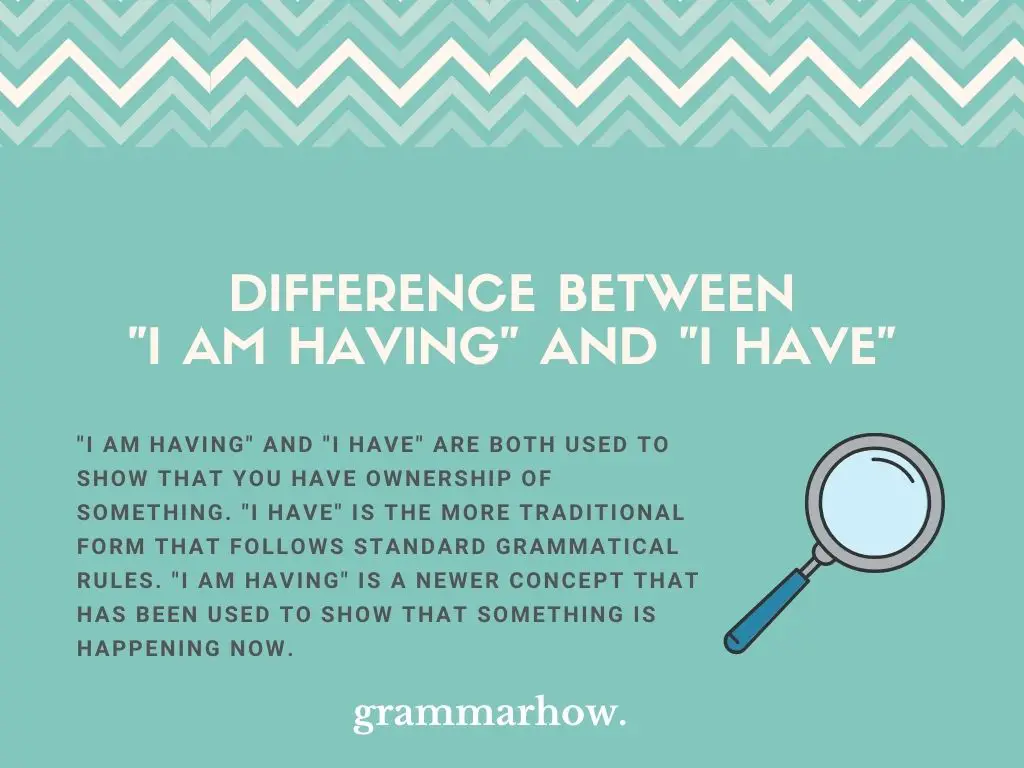Verb tenses can be confusing, but they can also be quite interesting. When you have a good grasp of the different verb tenses in English, it can really open you up to creating exciting prose. This article will explore the differences between “I am having” and “I have.”
Difference Between “I Am Having” and “I Have”
“I am having” and “I have” are both used to show that you have ownership of something. “I have” is the more traditional form that follows standard grammatical rules. “I am having” is a newer concept that has been used to show that something is happening now.

Generally, the two phrases can be used interchangeably. You’ll often find that with sentences like the following:
- I have a great deal of fun talking to you.
- I am having a great deal of fun talking to you.
“I have” and “I am having” are synonymous in this case. “I am having” is more related to the fact that it’s happening right now. “I have” could relate to either the past, present, or future, depending on the context.
However, they are not always interchangeable. Here are some examples:
- Correct: I have the keys.
- Incorrect: I am having the keys.
Here, “have” implies ownership. “Am having” does not allow you to do the same thing, and it is the incorrect tense.
I Am Having
“I am having” is a good choice when you are speaking informally. It allows you to show that you are experiencing something in the present. Often, you use it when you want to show how you feel or what you own.
It only works informally, and it’s not always interchangeable with “I have.” “I have” often allows you to claim ownership of certain items, which “I am having” cannot.
Also, “have” works well as an auxiliary verb, allowing you to set up perfect tenses. “Having” does not work in this same manner.
Here are some examples that will show you how to use “I am having” in a sentence:
- I am having a bit of difficulty understanding you. Do you think you can speak up a little more?
- You are having a hard time with this, and I completely get that! I hope we can work some of this out.
- He is having a go at it for you, though I don’t think you’re going to be able to find out whether he’s fixed it just yet.
- They are having the time of their lives. Maybe you should give them a little bit to get it out of their systems.
- We are having a conversation with him about this. We think it will be beneficial for us to get it all out on the table.
I Have
“I have” is a much more general variation of the verb choice. It allows you to show that you own something, or you could use it as an auxiliary verb to create a perfect tense (i.e. “I have left” or “I have needed”).
It’s a very versatile verb form. You’ll find that it works in many more scenarios than “I am having.”
Also, since it follows traditional English rules, it’s almost always correct to use in most instances. If in doubt, “I have” is going to be your best chance at being correct.
Perhaps these examples will help you to see how to use “I have” in a sentence:
- I have a bad feeling about all of this. Do you think there is any way for us to be able to reverse the effects?
- I have a few ideas, and I’d love to run them by you. Shall we pick a date to get all of this discussed?
- She has no idea what’s about to happen! I really can’t wait for us to introduce these plans to her.
- They have the car in gear. They’re ready to leave whenever you are. All you need to do is give them the signal.
- We have nowhere else to go. Please, let us stay with you for a little while. We’ll make it worth your time!
Final Thoughts
“I am having” and “I have” are interchangeable when you are referring to things that you might “have” at present. “I have” is much more general and follows traditional rules, though. You’ll often find it works in many more contexts, making it the more suitable choice.

Martin holds a Master’s degree in Finance and International Business. He has six years of experience in professional communication with clients, executives, and colleagues. Furthermore, he has teaching experience from Aarhus University. Martin has been featured as an expert in communication and teaching on Forbes and Shopify. Read more about Martin here.

